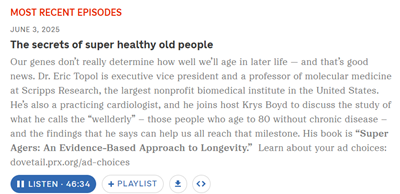Listened to some of this in bed last night, interesting enough to post here, podcast in link if interested.
https://www.npr.org/podcasts/478859728/think
Our genes don’t really determine how well we’ll age in later life — and that’s good news. Dr. Eric Topol is executive vice president and a professor of molecular medicine at Scripps Research, the largest nonprofit biomedical institute in the United States.
He’s also a practicing cardiologist, and he joins host Krys Boyd to discuss the study of what he calls the “wellderly” – those people who age to 80 without chronic disease – and the findings that he says can help us all reach that milestone. His book is “Super Agers: An Evidence-Based Approach to Longevity.”
https://www.npr.org/podcasts/478859728/think


